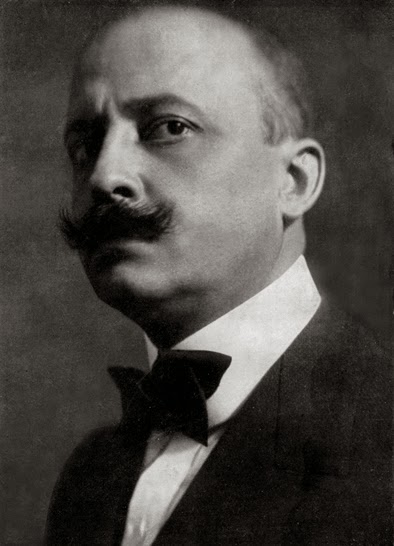I knew there’d be a fascinating tension in the essay in this Antonio Gramsci collection called “Marinetti the Revolutionary?” Looking back on this essay retroactively, there is a profound irony. Marinetti was a supporter of fascism from the beginning of the movement until the end of his life, having forged his political philosophy in the vision of humanity having become machine.
 |
| The suitably intense Filippo Marinetti. |
The basic idea of Marinetti’s politics of the technological man seems to have predated the horrors of the First World War, but the Great War solidified them — the old order would be destroyed, and replaced with a culture that did not breed individuals, but parts of a machine, who would strike at lesser peoples and nature with a steel existence forged in mechanized warfare. As I’ve read more of totalitarian political philosophy, I’ve come to see how the Great War truly made totalitarianism possible. An often-repeated platitude today about the Holocaust is that it’s inconceivable. After you’ve seen a generation of people ground into gristle by mechanized destruction, something like the Holocaust would be thinkable, possible, even sensible. This is the trajectory of Marinetti’s philosophy as it goes to work in the real world of politics, war, and the worst impulses and plans of humanity.
So it is phenomenally jarring to read a champion of people’s freedom from oppression of all kinds like Gramsci praise Marinetti, after a fashion. The profound irony in reading this text so long after the totalitarian fascism of the time has petered out and faded away is knowing Gramsci’s fate. Several years after writing this essay, he was arrested by the Italian fascist state authorities and imprisoned. He would spend the rest of his life there, eventually dying in 1937. For the previous three years, he had won release on health grounds, but was confined to hospitals anyway. Gramsci was a great political philosopher who was a victim of fascism. Marinetti was a great political philosopher who was a champion of fascism.
Gramsci’s reason for praise lies in his respect for Marinetti’s fearlessness. His philosophy of Futurism, the ideas that drove his artists’ collective into political action, was animated by an embrace of destruction. When Marinetti saw the monuments of ancient Rome, he felt no reverence for them. He wanted the Coliseum razed to dust to build new monuments to new technologies and new forms of humanity.
When Gramsci looked at his fellow leftists, even the most radical ones, he saw none of this demented vision of destruction. But he knew that, if one wanted to transform society, one would have to embrace destruction in some form or another. The old institutions and the traditional moral and political habits of his culture would have to be rebuilt if the socialist revolution Gramsci worked toward all his life was to succeed.
Not only did Marinetti want the destruction of revolution, but was the first to understand that it had already occurred. The advent of enormous industry in the 19th century brought radical social transformation, even though it was mostly along Marinetti’s preferred path of making humanity grist for the mill of machines. The old ways of life had already been destroyed in the industrial heartlands of Britain, France, and Germany. Italy and Russia had to wait for the Great War and its factories of human mincemeat to destroy the old social order.
Marinetti and the Futurists were the only ones who could stare straight into this horror and were unafraid to sweep away the detritus of the old culture, no matter what casualties may result. Gramsci was enough of a revolutionary and enough of a philosophical gentleman to respect that vision, even though its particulars would have abhorred him.
No comments:
Post a Comment